
Background information
5 good reasons to start the year with sports for all the family
by Michael Restin

Unicef is a blank slate for Elina. Before the nine-year-old takes part in "Cycling for children", she does some research at the Zurich office of the UN Children's Fund and finds out that Unicef is not just a cycling event in Uster, but also an advocate for all children - and a bit like McDonalds.
Unicef is a world-famous logo. These are superstars who visit aid projects in Africa as ambassadors. It's the lettering on Lionel Messi's jersey. Unicef is out there in the world. And right around the corner from us, in a new building in Zurich's Kreis 5 district. Exposed concrete, modern art in the stairwell and a doorbell sign on the first floor that reads "Please enter without ringing". Unicef is open. Elina, photographer Thomas and I enter and take sweets from the bowl at the reception desk. No one to be seen. We press the silver doorbell, which sends an elegant "Diiing" through the quiet open-plan office. Unicef is a bit more complicated than we thought.
Elina giggles. She is nine years old, comes from Basel, plays the harp and goes to the children's circus. She is here because she is taking part in the Unicef event "Cycling for children", which takes place on 15 June around Lake Greifensee. Unicef is a blank slate for her, which she wants to get an idea of with the questions on her piece of paper.
Jürg Keim is head of the media office of Unicef Switzerland and Liechtenstein. He welcomes us with hot espresso, cool water and warm words to dispel our nervousness. Elina admits that she had to think for a few days about whether she wanted to do this interview. "But then I thought: it's really cool if I can do this!"
"It's also brave," says Jürg Keim. "You come into contact with things that you probably didn't deal with at school."
True.
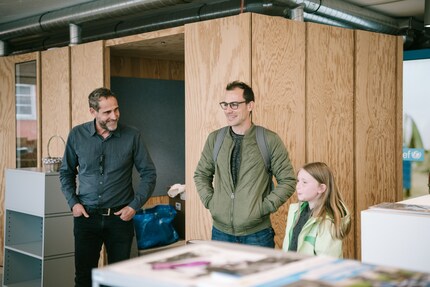
"What does Unicef actually do?" Elina wants to know at the beginning. "It campaigns for children and children's rights all over the world," says Jürg Keim. "Because most children are not yet able to look after themselves, they need special protection." He explains, clarifies and quickly ends up with unwieldy terms such as "legal subject" or "Convention on the Rights of the Child".
Elina listens intently and, with a questioning look on her face, asks him to decipher the word monsters into simple sentences. Jürg Keim understands. "It's a treaty that almost every country in the world has signed. All children's rights are written down in it." Unicef is something like the advocate for children worldwide and is there to enforce their rights. "You can imagine that this is extremely difficult in war zones, for example." He talks about the right to life. Participation. Equality. Education.
"And how did Unicef come about?" asks Elina. "It was set up after the Second World War. That's when the UN was formed, which is basically the entire global community. One part of it is Unicef, which specifically looks after children."
Unicef is a great organisation that was created when the world was in ruins. And nothing like Elina's ideal world. "Why can't parents help their children?" she wants to know.
"Children need special protection, especially in crisis regions, because they are more exposed to danger there. Or because they have been separated from their parents or no longer have any. In such cases, one of Unicef's tasks is to reunite families," explains Jürg Keim. Unicef mediates. Is the vital immunisation. Clean drinking water. Emergency aid after the earthquake. Or the greeting card for Christmas, a payment slip in the letterbox. Depending on whether the stars were aligned favourably when you were born.
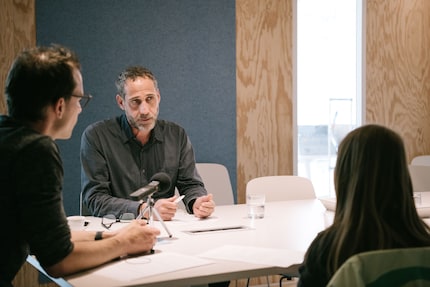
Unicef is also a sport and an event. There is the "Harmony Geneva Marathon for UNICEF" in Geneva. Or "Cycling for children", soon to be held in Uster and around Lake Greifensee.
"What exactly do you do?" asks Elina.
"It's a cycling event that we're organising for the fourth time this year," says Jürg Keim. "Individuals, families and even entire companies can take part."
The start and finish point is Uster, the route runs around Lake Greifensee in just under 20 kilometres. A donation of 100 francs is required as an entry fee, and participants can also set their own goals. Both in sporting terms and in terms of the amount raised, which will go towards one of Unicef's main causes: "With the event, we raise as much as possible to use the money in programmes against child mortality."
"Are you collecting for Switzerland or for the whole world?"
Elina follows up. "It's for the whole world. Infant mortality in Switzerland is minimal, we don't have a programme," says Jürg Keim. The money goes to countries where there are famines, for example. In developing countries. "There is no specific purpose for the donations, but they are generally collected for the survival of children." Unicef is a large collection centre. The money tap is turned on wherever children are in need.
The figure that Jürg Keim brings up is large and fills the room for a few seconds: "15,000 children die every day from preventable diseases."
About one every six seconds. One small town a day. People are cycling on Lake Greifensee. Crimer sings. Ski ace Tina Weirather is available for selfies. Actor Anatole Taubman too. "Cycling for children" is supposed to be fun and save lives. Event here, misery there. A lot to take in, not just for Elina.
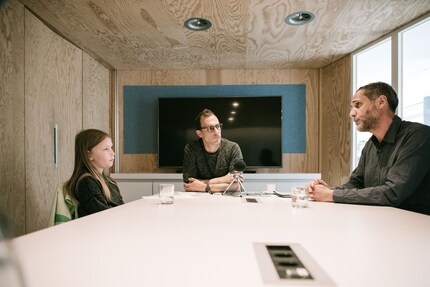
"If you want to take part, you can open a donor account on our website. Then you ask your family and friends whether they want to support you or take part themselves," says Jürg Keim, explaining the basic idea. In English, this is called "peer-to-peer" when everyone activates their personal network. Elina has also noticed that everything is in English. "Why isn't it just called 'cycling for children'?" This question is point ten on her cheat sheet. She thinks practically.
"Our language is English, of course, and the event doesn't only exist in Switzerland," replies Jürg Keim. It is very successful in Holland, for example. In Switzerland, "Cycling for children" has been held three times in French-speaking Switzerland, most recently in Crans Montana. Now in Uster. Unicef is flexible. And a brand. Of course, such events are also about keeping people's minds positive. "Ideally, it's a win-win-win situation. People donate, exercise and have a great day out."
It is impossible to say which children will be the winners. "It is not determined in advance exactly which projects the money will go towards," says Jürg Keim. But it doesn't trickle away.
"How do you know which child needs help right now?" asks Elina. "Because we are spread all over the world and are always in contact with the local communities," replies Jürg Keim. We work very closely with the governments. "Even if they are dictators and it is very difficult, we have to get along with them. Because we don't just want to give money in the short term, we want to help children in the long term." Unicef has 156 country offices in developing and emerging countries. And 34 national committees in industrialised countries, like here in Zurich for Switzerland and Liechtenstein.
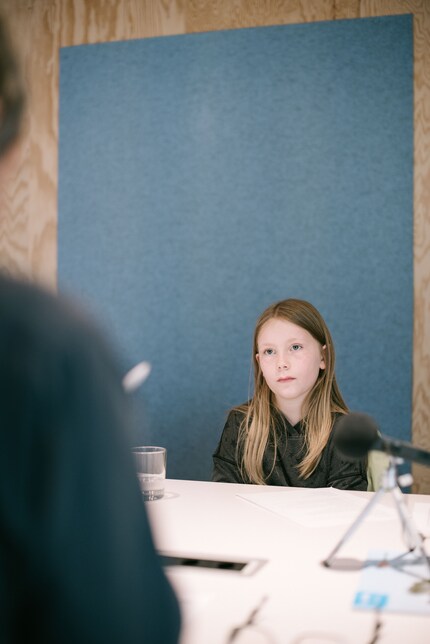
"And how many children do you help in Switzerland?" Elina wants to know. That's difficult to say, says Jürg Keim. Unicef does not provide direct individual help here, but creates structures. "For example, we have a label - do you know what a label is?" Elina nods. "The label is called 'child-friendly community'. The municipalities that receive it commit to putting children and their concerns at the centre." The children are consulted when it comes to the construction of a new school building or a safe footpath, for example. "They have a say and can also assemble in their own parliament." Unicef is very different in the first world than in the third.
"You're from Basel, aren't you?" asks Jürg Keim. "It's the best 'children's city' in the whole of Switzerland! A model city that has already gone a long way with the label."
Who would have known? Elina didn't. Unicef is sometimes still too invisible. The Convention on the Rights of the Child could also be better known. In its "Concluding observations on Switzerland's second, third and fourth periodic reports", the UN Committee on the Rights of the Child does not only have words of praise for the situation in Switzerland.
"The Committee is concerned that children, parents and the general public are barely aware of the Convention."
This is different for Elina. Jürg Keim answers all her questions, but Unicef is too much for one conversation. Unicef is the big umbrella organisation for countless projects and contracts. It encompasses everything. The plasters, the immunisation, the school building made from recycled plastic as a building material. Children's parliaments and child-friendly communities. Unicef is hard to believe. After an hour, Elina and I look at each other, exhausted.
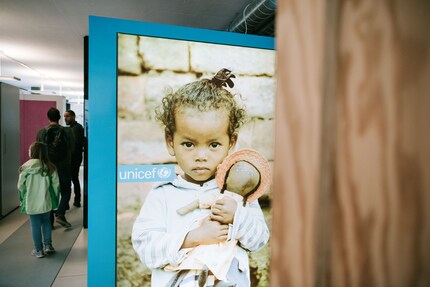
"We're not the real Unicef, by the way," says Jürg Keim. Excuse me? Unicef is not Unicef? "We're an organisation that was founded 60 years ago and signed an agreement with the headquarters in New York and Geneva, subject to many conditions, to collect money for children in the name of Unicef." It's a bit like McDonalds. The individual stores are also given permission to use the name. But the quality is controlled and has to be right. We laugh. Like McDonalds? Unicef is full of surprises.
Jürg Keim gives us a final tour of the office. Unicef is predominantly female, at least here and now. We shake hands, meet friendly people at discreet workstations, see fairly produced trainers bobbing under office chairs. It is as clean, correct and organised here as it will ever be in the outside world. And the Unicef blue is always shining reassuringly somewhere.
When we're back on the street, I ask Elina how she liked it. Was it exciting? Or was it too much, too complicated? Elina seems to be at peace with herself, the world and Unicef. "He explained it well," she says with satisfaction. She is looking forward to "Cycling for children". We suck on the sweets that we had pocketed at the beginning. The Unicef tastes sweet, but is sugar-free. A bit contradictory. But always endeavouring to do everything right.
Simple writer and dad of two who likes to be on the move, wading through everyday family life. Juggling several balls, I'll occasionally drop one. It could be a ball, or a remark. Or both.
Interesting facts about products, behind-the-scenes looks at manufacturers and deep-dives on interesting people.
Show all
Background information
by Michael Restin
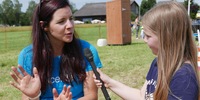
Background information
by Michael Restin

Background information
by Ann-Kathrin Schäfer